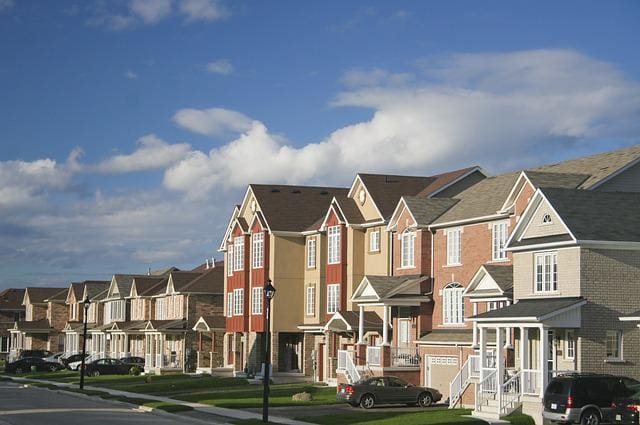Buying a house can be a huge investment. In fact, certain properties can be at least 1 million dollars. That is why many people think that only those who make a lot of money can afford to buy their own homes. However, this is not always the case. You might be surprised to know that even if you make 70K a year, you can still purchase your dream home.
Now comes the question, “If I make $70,000 a year, how much house can I afford?” In this article, we will give you tips on calculating this so that you can make the best decisions in your purchase.
Using the 28/36 Rule
The most basic method to determine how much you should spend on a house is the 28/36 rule.
According to the article that you will find here, https://homesbyardor.com/i-make-70000-a-year-how-much-house-can-i-afford/, this rule implies that you should not spend more than 28% of your gross monthly income (before taxes) on your housing costs (mortgage payments, insurance, etc.), and no more than 36% on all of your debts (housing costs + any other debts you may have).
So, if you make $70,000 a year, you bring home about $5,833 per month. You can calculate 28% from this amount, which should be the maximum mortgage you have to pay per month, which is $1,633.
You can also calculate 36% of your monthly income, around $2,100. This means that if your mortgage payments, plus your other debts, per month exceed this amount, it could be difficult for you to make your payments on time and could impact your credit score.
So, if you were asking, “Can I afford a 300K house on a 70K salary?” Of course, you can. It all comes down to your willingness to spend on your monthly mortgage payments and the loan term.
However, these are just general guidelines, and you may be able to qualify for a mortgage that is higher than 28% of your monthly income. But it is still a good idea to use this rule as a starting point when considering how much house you can afford.
Using the Debt-to-Income Ratio Rule
Another method often used to calculate how much a house you can afford is the debt-to-income ratio (DTI) rule.
Simply divide your monthly debts by your gross monthly income to calculate this ratio. So, if you make $70,000 a year and have $2,000 in monthly debts (credit card payments, student loans, etc.), then your debt-to-income ratio would be 28%.
Generally speaking, most lenders would be willing to offer a mortgage on a 70K salary if your DTI does not exceed 43%. So, if your DTI is higher than this, you may need to either make more money or reduce your monthly debts before qualifying for a mortgage.
4 Factors That Affect Your Chances of Getting Pre-Approved for a Mortgage
You need to know that your salary is not the only factor that will affect how much house you can afford. There are other things to consider, such as the following.
1. Your Credit Score
This would be the most important metric that lenders will look into when considering you for a mortgage. A good credit score shows that you’re a responsible borrower and are more likely to make your payments on time.
Generally, most lenders would like to see a credit score of at least 620 to offer a 70K income mortgage. However, options are still available if your credit score is below this. You can talk to a lender about what they would require from you to get pre-approved for a mortgage.
Remember that your credit score not only affects how much house you can afford but also the interest rate of your loan. So, if you have a good credit score, you may be able to qualify for a lower interest rate which could save you thousands of dollars over the life of your loan.
If you’re unsure of your credit score, you can check it for free on websites like Credit Karma or Credit Sesame.
2. Borrowing History
Lenders will also take a close look at your borrowing history. This includes whether you’ve missed any payments in the past, declared bankruptcy, or have a lot of debt.
Having a good borrowing history will work in your favor when trying to get pre-approved for a mortgage. However, if you have some negative items on your credit report, it’s still possible to get approved for a loan, but you may need to make a larger down payment or agree to a higher interest rate.
You can also take some steps to improve your records, such as paying off any outstanding debts, disputing any errors on your credit report, or becoming an authorized user on someone else’s credit card.
3. Employment History
Most lenders like seeing at least two years of steady employment before offering you a mortgage. So, if you’re self-employed or have had any gaps in your employment history, getting approved for a loan is still possible. Still, you may need to provide additional documentation, like tax returns or bank statements.
If you’re concerned about your employment history, you can best speak with a lender and let them know about your situation. They may be able to work with you and make some accommodations.
4. Down Payment
Naturally, if you have a larger down payment, you’ll be able to afford a more expensive home.
In general, most lenders would like to see a down payment of at least 20%. However, some programs, such as an FHA, are available that allow for a lower down payment. Some first-time homebuyer programs offer grants or loans for the down payment.
Available Options for a 70K Income Mortgage

Now that we have answered the question, “If I make $70,000 a year, how much house can I afford?” it is time to explore your loan options. Here are the most popular types of mortgages that you can take out for a home purchase today.
Conventional Mortgage Loan
This could be the most common type of mortgage for 70K salary earners. A conventional mortgage loan is a home loan that is not guaranteed or insured by the government. These loans are available through private lenders and typically have stricter requirements than government-backed loans, like an FHA loan.
Again, to qualify for a conventional mortgage loan, you’ll usually need a credit score of at least 620 and a down payment of at least 20%. You may also be required to have private mortgage insurance (PMI) if you make a down payment that is less than 20% of the purchase price.
FHA Loan
An FHA loan is a home loan backed by the Federal Housing Administration. These loans are available to borrowers with as little as a 580 credit score and a minimum down payment of as low as 3.5 percent of the total price. FHA loans are a good option for first-time homebuyers or anyone with a limited borrowing history.
One thing to keep in mind with an FHA loan is that you’ll be required to pay a mortgage insurance premium (MIP). This differs from PMI and is only required if you make a conventional loan with less than a 20% down payment. You’ll have to pay MIP with an FHA loan regardless of your down payment amount.
VA Loan
A VA loan is a home loan available to active duty military members, veterans, and their spouses. These loans are backed by the Department of Veterans Affairs (VA) and offer great benefits, like no down payment (in most cases) and no monthly mortgage insurance premiums.
To qualify for a VA loan, you’ll need to obtain a certificate of eligibility from the VA. You can complete an online application or contact your local VA office. Once you have your certificate, you can start shopping for a lender who offers VA loans.
USDA Loan
Like the FHA and VA loans, a United States Department of Agriculture (USDA) loan is also a government-backed loan. These loans are available to low and moderate-income borrowers looking to purchase a home in a rural area. One of the great things about USDA loans is that they offer 100% financing, which means you can buy a home with no down payment.
To qualify for a USDA loan, you’ll need to make sure your income falls below the maximum limits set by the USDA and that the property you’re interested in purchasing is located in an eligible rural area. You can check both of these requirements on the USDA website.
Jumbo Loan
This type of loan is designed for borrowers looking to purchase a more expensive home. Jumbo loans typically have higher loan limits than other home loans, but they can be harder to qualify for.
To qualify for a jumbo loan, you’ll usually need a credit score of at least 700 and a down payment of at least 20%. You may also be required to have PMI.
So, “What mortgage can I afford on 70K?” you ask? No matter what type of loan you get, it is very important to know the terms that come with it, your budget, and what you can realistically afford.
Which Types of Homes Can You Buy with a $1,633 Monthly Mortgage?

So, how much house can you afford on 70K? With the capacity to pay a monthly mortgage of $1,633, you should have a maximum house price of approximately $266,950 using the 28% rule. However, this does not include other housing costs, such as insurance and taxes, which can add more to your monthly payment.
Regardless, here are the types of homes that you can buy with such an amount today.
Single-Family Homes
You will find that most of the houses that are available for purchase will be single-family homes. These detached structures come with a wide range of prices, styles, and sizes. Depending on your needs and budget, you can find starter homes or larger residences.
The average price for these properties can run from $200,000 to $300,000, which gives you a few options to consider even at the upper end of your budget.
Apartments and Condos
If you are not interested in a detached home, you always have the option of going for an apartment or condo unit. These attached residences make a living in certain areas easier and more affordable, especially if you desire to be near the city.
The average price range for apartments and condos can start at $100,000 but can quickly go up to $400,000, depending on the location and size of the unit. You will need to ensure that your homeowners’ association (HOA) dues are included in your monthly budget so that there are no surprises down the line.
Fixer-Uppers
Now, this would be the most affordable option you have. If you’re handy and don’t mind doing some repair work, buying a fixer-upper can be a great way to save money on your new home. Make sure you have a realistic idea of the costs of repairs before making an offer on a property.
Fixer-uppers are also a good option if you’re looking for a home in a specific neighborhood that you might not otherwise be able to afford. For example, let’s say you find a fixer-upper that needs $20,000 in repairs and is listed for $200,000. That means the property only costs you $180,000 after repairs. If the same house in the same neighborhood was move-in ready and listed for $250,000, you’d be paying $70,000 more for the same property.
Of course, there are always risks when buying a fixer-upper. The biggest risk is that the repairs end up costing more than you expected. That’s why getting a realistic estimate of the repair costs is important before proceeding with the purchase.
What’s Next?
At this point, you should already have an informed answer to the question, “If I make $70,000 a year, how much house can I afford?” So, what are you waiting for? Talk to your financial advisor, a mortgage specialist, and a real estate agent to get started on your home-buying process today.
For more handy tips and information on real estate, feel free to check out the other articles on our site!
Featured Photo by Tima Miroshnichenko: https://www.pexels.com





